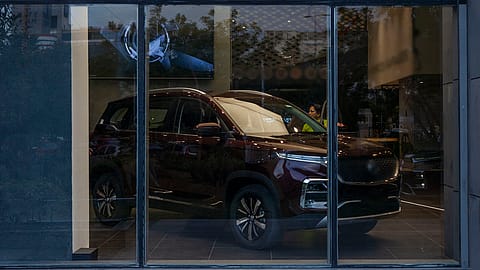Income tax cuts to boost demand for cars, two-wheelers
The government has significantly increased budgetary allocation for the PM E-DRIVE scheme.

The proposed income tax cuts could boost the middle class's spending power, potentially increasing demand for two-wheelers, three-wheelers, and small cars, according to Saurabh Agarwal, partner and automotive tax leader, EY India.
Apart from tax relief, the government has significantly increased budgetary allocations, with PM E-DRIVE receiving ₹4,000 crore, Auto PLI (production-linked incentive scheme) being bolstered by ₹2,218 crore, and ACC PLI benefiting from an infusion of ₹155 crore.
TVS Motor Company's managing director Sudarshan Venu called the budget a "game-changer." "Tax relief for the middle class means more disposable income driving consumption. The National Manufacturing Mission’s focus on clean manufacturing will further strengthen investment in India’s EV sector," says Venu.
The relief provided to the middle class under the new tax regime places more disposable income in the hands of the Indian consumer. This, according to Mahindra & Mahindra Group MD and CEO Anish Shah, will encourage private sector capex to move in a positive direction.
The budget also emphasises the complete exemption of Basic Customs Duty (BCD) on cobalt powder and waste, scrap of lithium-ion battery, lead, zinc, zirconium, copper, etc.
Rajeev Chaba, CEO Emeritus, JSW MG Motor India, says the Union Budget’s new tax regime introduces substantial relief for young earning professionals and this is a positive sign for all consumer-facing industries. “On the automotive front, the Government's focus on enhancing domestic manufacturing capabilities and battery production will help India’s emerging EV market and boost local manufacturing,” says Chaba.
Commenting on the Budget SIAM President Shailesh Chandra says the specific focus on rural prosperity and agriculture, coupled with reforms in the personal income tax, is likely to have a positive effect on the auto industry, and will help in creating demand. The industry will specifically benefit from the National Manufacturing Mission, which supports clean tech manufacturing for batteries, motors and controllers, says Chandra. “The exemption of critical minerals (e.g. Cobalt, Lead, Zinc etc.), scraps of Lithium-ion battery, and 35 additional capital goods from customs duty, will help create a strong EV ecosystem in the country,” he adds.
Recommended Stories
Sulajja Firodia Motwani, founder and CEO of Kinetic Green, called the Budget "progressive", which paves the way for robust economic growth through its strong emphasis on agricultural reforms, support to MSMEs, and capital expenditure. "The increase in the income tax exemption limit is a significant step that will enhance consumption and drive demand," says Motwani. "The exemption of Basic Customs Duty (BCD) on critical minerals like cobalt, lead, and lithium scrap will streamline the EV battery and cell supply chain, reducing costs and boosting efficiency. Additionally, the exemption on BCD for capital goods used in lithium-ion battery manufacturing is a welcome move to strengthen domestic battery production. Further, the promotion of ‘Make in India’ for key EV components such as controllers and motors, alongside incentives for solar PV cell manufacturing, will accelerate India’s transition towards clean mobility and sustainable energy solutions."
Shradha Suri Marwah, president of the Automotive Component Manufacturers Association of India (ACMA), says the Union Budget 2025-26 is forward-looking and growth-centric, reinforcing the government’s commitment to strengthening India’s manufacturing sector and driving the transition to cleaner mobility solutions. “The proposals for personal Income Tax will put more money in the hands of people thus fuelling consumption leading to economic growth,” says Marwah.
Tax exemptions for lithium battery production, the removal of Basic Customs Duty on critical minerals, and the duty-free import of key EV battery production equipment reflect the government's strong commitment to bolstering domestic manufacturing and reducing import dependency, says Ajinkya Firodia, Vice Chairman and Managing Director, Kinetic Engineering.
Vinod Aggarwal, MD & CEO of VECV, says the rationalisation of custom duties on key raw materials and the reduction of inverted duty structures will also enhance cost-effectiveness in domestic manufacturing.
(INR CR)
GP Hinduja, chairman of Hinduja Group, says the middle class gets a significant tax relief after a decade to boost consumption and eventually revive demand. “It would have helped if the EV charging infrastructure could have been given an industry status. Maintaining capex levels while lowering taxation is huge but needs more details,” says Hinduja.
The emphasis of the government on green energy, EV infrastructure, AI-led innovation, and digital transformation would place India on further accelerated net-zero emission paths and spur technological leadership for the country simultaneously, says Niranjan Nayak, managing director, Delta Electronics India. “Higher penetration of clean mobility will be facilitated through investments in modernizing smart grids and EV charging infrastructure,” Nayak says.
Commenting on the Budget, Jagjeet Singh Sareen, Partner & Global Climate Leader at Dalberg Advisors and member secretary of the Bharat Climate Forum, said the Union Budget 2025 underscores a transformative Manufacturing Mission, driving India towards an Atmanirbhar, Green, and Viksit Bharat by 2047. "By prioritising cleantech manufacturing, resilient supply chains, and innovation, the mission strengthens India's position in the global economy while advancing sustainability goals," says Sareen. "The Bharat Climate Forum is committed to supporting the full realisation of this vision. Over the next six months, we will engage senior policymakers, cleantech leaders, and experts to shape a robust implementation roadmap."